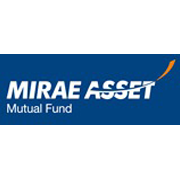
Fund categories


ELSS Funds


Mirae Asset ELSS Tax Saver Fund - Direct (G)
Equity | ELSS
1Y returns
13.73%Min. Invest
₹500
AUM
₹27,069.09 Cr

Sundaram LT Tax Advantage Fund - Sr.II-Dir (G)
Equity | ELSS
1Y returns
12.47%Min. Invest
₹5,000
AUM
₹13.33 Cr

WhiteOak Capital ELSS Tax Saver Fund - Direct (G)
Equity | ELSS
1Y returns
12.35%Min. Invest
₹500
AUM
₹437.92 Cr

HDFC ELSS Tax Saver Fund - Direct (G)
Equity | ELSS
1Y returns
12.14%Min. Invest
₹500
AUM
₹17,194.16 Cr

Aditya Birla SL ELSS Tax Saver Fund - Direct (G)
Equity | ELSS
1Y returns
11.89%Min. Invest
₹500
AUM
₹15,681.73 Cr

ICICI Pru ELSS Tax Saver Fund - Direct (G)
Equity | ELSS
1Y returns
11.63%Min. Invest
₹500
AUM
₹14,844.09 Cr

Mahindra Manulife ELSS Tax Saver Fund - Direct (G)
Equity | ELSS
1Y returns
11.17%Min. Invest
₹500
AUM
₹970.35 Cr

Sundaram ELSS Tax Saver Fund - Direct (G)
Equity | ELSS
1Y returns
11.08%Min. Invest
₹500
AUM
₹1,398.23 Cr

Edelweiss ELSS Tax Saver Fund - Direct (G)
Equity | ELSS
1Y returns
11.08%Min. Invest
₹500
AUM
₹439.50 Cr

ITI ELSS Tax Saver Fund - Direct (G)
Equity | ELSS
1Y returns
10.54%Min. Invest
₹500
AUM
₹445.70 Cr

PGIM India Elss Tax Saver Fund - Direct (G)
Equity | ELSS
1Y returns
10.18%Min. Invest
₹500
AUM
₹782.13 Cr

Sundaram Value Fund - Direct (G)
Equity | ELSS
1Y returns
9.91%Min. Invest
₹100
AUM
₹1,480.99 Cr

Baroda BNP Paribas ELSS Tax Saver Fund - Direct (G)
Equity | ELSS
1Y returns
9.65%Min. Invest
₹500
AUM
₹934.60 Cr

DSP ELSS Tax Saver Fund - Direct (G)
Equity | ELSS
1Y returns
9.64%Min. Invest
₹500
AUM
₹17,241.31 Cr

Union ELSS Tax Saver Fund - Direct (G)
Equity | ELSS
1Y returns
9.25%Min. Invest
₹500
AUM
₹921.54 Cr

AXIS ELSS Tax Saver Fund - Direct (G)
Equity | ELSS
1Y returns
9.22%Min. Invest
₹500
AUM
₹35,171.95 Cr

Bandhan ELSS Tax Saver Fund - Direct (G)
Equity | ELSS
1Y returns
9.09%Min. Invest
₹500
AUM
₹7,214.53 Cr

Tata ELSS Fund - Direct (G)
Equity | ELSS
1Y returns
9.03%Min. Invest
₹500
AUM
₹4,716.95 Cr

Canara Robeco ELSS Tax Saver - Direct (G)
Equity | ELSS
1Y returns
9.00%Min. Invest
₹500
AUM
₹9,072.61 Cr

Nippon India ELSS Tax Saver Fund - Direct (G)
Equity | ELSS
1Y returns
8.99%Min. Invest
₹500
AUM
₹15,512.93 Cr

HSBC ELSS Tax Saver Fund - Direct (G)
Equity | ELSS
1Y returns
8.95%Min. Invest
₹500
AUM
₹4,214.73 Cr

JM ELSS Tax Saver Fund - Direct (G)
Equity | ELSS
1Y returns
8.57%Min. Invest
₹500
AUM
₹224.19 Cr

Parag Parikh ELSS Tax Saver Fund - Direct (G)
Equity | ELSS
1Y returns
8.37%Min. Invest
₹500
AUM
₹5,790.91 Cr

SBI ELSS Tax Saver Fund - Direct (G)
Equity | ELSS
1Y returns
8.36%Min. Invest
₹500
AUM
₹31,782.82 Cr

Sundaram LT MC Tax Advantage Fund-Sr.V-Dir (G)
Equity | ELSS
1Y returns
8.28%Min. Invest
₹500
AUM
₹31.18 Cr

Sundaram LT MC Tax Advantage Fund-Sr.IV-Dir (G)
Equity | ELSS
1Y returns
8.07%Min. Invest
₹5,000
AUM
₹36.56 Cr

Motilal Oswal ELSS Tax Saver Fund-Dir (G)
Equity | ELSS
1Y returns
7.85%Min. Invest
₹500
AUM
₹4,514.53 Cr

Navi ELSS Tax Saver Fund - Direct (G)
Equity | ELSS
1Y returns
7.47%Min. Invest
₹500
AUM
₹53.95 Cr

Franklin India ELSS Tax Saver Fund - Direct (G)
Equity | ELSS
1Y returns
7.44%Min. Invest
₹500
AUM
₹6,787.62 Cr

HSBC Tax Saver Equity Fund - Direct (G)
Equity | ELSS
1Y returns
7.42%Min. Invest
₹500
AUM
₹246.30 Cr

UTI-ELSS Tax Saver Fund - Direct (G)
Equity | ELSS
1Y returns
7.18%Min. Invest
₹500
AUM
₹3,778.10 Cr

Quant ELSS Tax Saver Fund - Direct (G)
Equity | ELSS
1Y returns
6.90%Min. Invest
₹500
AUM
₹12,444.11 Cr

Taurus ELSS Tax Saver Fund - Direct (G)
Equity | ELSS
1Y returns
6.17%Min. Invest
₹500
AUM
₹78.65 Cr

Kotak ELSS Tax Saver Fund - Direct (G)
Equity | ELSS
1Y returns
6.01%Min. Invest
₹500
AUM
₹6,449.48 Cr

LIC MF ELSS Tax Saver - Direct (G)
Equity | ELSS
1Y returns
5.98%Min. Invest
₹500
AUM
₹1,113.63 Cr

Quantum ELSS Tax Saver Fund - Direct (G)
Equity | ELSS
1Y returns
5.54%Min. Invest
₹500
AUM
₹224.18 Cr

Groww ELSS Tax Saver Fund - Direct (G)
Equity | ELSS
1Y returns
5.44%Min. Invest
₹500
AUM
₹53.03 Cr

SBI Long Term Advantage Fund - Series IV -Dir (G)
Equity | ELSS
1Y returns
4.83%Min. Invest
₹500
AUM
₹213.14 Cr

Invesco India ELSS Tax Saver Fund - Direct (G)
Equity | ELSS
1Y returns
4.79%Min. Invest
₹500
AUM
₹2,865.79 Cr

NJ ELSS Tax Saver Scheme - Direct (G)
Equity | ELSS
1Y returns
2.13%Min. Invest
₹500
AUM
₹306.88 Cr

Bank of India ELSS Tax Saver - Direct (G)
Equity | ELSS
1Y returns
1.69%Min. Invest
₹500
AUM
₹1,417.05 Cr

Shriram ELSS Tax Saver Fund - Direct (G)
Equity | ELSS
1Y returns
1.43%Min. Invest
₹500
AUM
₹49.80 Cr

SBI Long Term Advantage Fund - Series III -Dir (G)
Equity | ELSS
1Y returns
-1.63%Min. Invest
₹500
AUM
₹69.12 Cr

Samco ELSS Tax Saver Fund - Direct (G)
Equity | ELSS
1Y returns
-4.87%Min. Invest
₹500
AUM
₹123.50 Cr

Bajaj Finserv ELSS Tax Saver Fund - Direct (G)
Equity | ELSS
1Y returns
%Min. Invest
₹500
AUM
₹72.24 Cr

What are ELSS (Equity Linked Savings Scheme) Mutual Funds?
ELSS or Equity Linked Saving Schemes are investment options. These funds primarily invest in stocks and offer tax benefits under Section 80C of the Income Tax Act 1961. So, you can save up to Rs. 1.5 lakh in taxes each year. ELSS funds have a 3 year lock in period, which is the shortest among other tax-saving investments. These funds aim to provide high returns by investing in equity markets. But, they also come with higher risks compared to other tax saving mutual funds.Key Features of ELSS Funds
There are a lot of things that you must be aware of when investing in ELSS funds. Hence, to give you more clarity, here are some of its key features.- Taxation - These funds offer tax deductions of up to Rs. 1.5 lakh each year in Section 80C of the Income Tax Act.
- Lock-in period - They have a mandatory lock-in period of three years. This is the shortest among other tax-saving investments.
- Equity investment - ELSS primarily invests in equities, aiming for high returns by leveraging the stock market.
- Potential for high returns - ELSS funds can provide inflation-beating returns due to their equity exposure.
- Investment Flexibility - Investors can choose between lump sum investments or Systematic Investment Plans (SIPs).
- Capital Appreciation - These funds aim for long-term capital growth, often delivering inflation-beating returns.
How do ELSS Funds Work?
These funds take the sum accumulated by multiple investors and invest it primarily in equity stocks. When you invest in an ELSS fund, you buy units of the fund. Your money is then managed by professional fund managers who select a diversified portfolio of stocks.The performance of the ELSS fund depends on the performance of these underlying stocks. These funds have a mandatory lock-in period of three years, during which you cannot withdraw your investment. This lock-in period helps mitigate short-term market volatility and encourages long-term investment. Additionally, investments in these funds are eligible for tax deductions of up to Rs. 1.5 lakhs under the provisions of the Income Tax Act 1961.
After the lock-in period, you can choose to redeem your units or stay invested to potentially earn higher returns over a longer period.
Who Should Invest in ELSS Mutual Funds?
To get a grasp on the type of individuals who should invest in these funds, here are some examples.- Tax savers: People looking to save on taxes can benefit from ELSS, as it offers tax deductions up to rupees 1.5 lakh under Section 80C.
- Long-term investors: Individuals willing to stay invested for a minimum of 3 years, the mandatory lock-in period, can consider ELSS.
- Risk takers: Investors who are comfortable with market risks can invest, as even the best ELSS funds invest primarily in equities, which can be volatile.
- Wealth builders: It is good for people aiming for higher returns over the long term, as equities have the potential to outperform other asset classes.
- Diversified investors: These funds are good for people who are looking to diversify their portfolio with a mix of stocks from different sectors.
- Regular savers: Individuals who prefer investing small amounts regularly through Systematic Investment Plans (SIPs) can benefit from ELSS.
Why Invest in ELSS Funds?
Investing in ELSS funds offers several benefits. Firstly, they are the best tax saving funds, allowing you to claim deductions up to Rs. 1.5 lakh per year. This helps reduce your taxable income. These funds also have the potential for high returns since they primarily invest in equities. Historically, equities have delivered better returns compared to traditional tax-saving instruments. Additionally, they have a lock in period of just three years, which is the shortest among tax-saving options, providing greater liquidity. Lastly, ELSS funds offer diversification and professional management, making them flexible and attractive investments.Key Considerations When Choosing ELSS Mutual Funds
Equity Linked Savings Schemes (ELSS) are a popular investment choice for tax-saving purposes and potential long-term wealth creation. If you are planning to invest in them, here are some factors you need to consider -- Risk tolerance: These funds invest primarily in equities, which can be volatile. Hence, as an investor, you need to assess your risk tolerance to ensure you are comfortable with potential market fluctuations.
- Investment Horizon: ELSS funds are best suited for long-term goals. A longer investment horizon can help you ride out market volatility and potentially achieve better returns.
- Fund Performance: You need to evaluate the historical performance of the ELSS fund. Look for consistent returns over different market cycles and compare them with benchmark indices and peers.
- Fund Manager’s Track Record: The expertise of the fund manager plays a crucial role in the performance of the fund. So, you need to check the manager’s experience and past performance.
- Expense Ratio: This is the annual fee charged by the fund for managing your investment. A lower expense ratio means you may get higher net returns.
- Diversification: You need to ensure the ELSS fund has a well-diversified portfolio across various sectors.
What Are The Risks Involved with ELSS Mutual Fund Schemes?
Investing in an ELSS mutual fund involves certain risks. Since they primarily invest in equities, they are subject to market volatility. This means that the value of your investment can fluctuate based on stock market performance, which can lead to potential losses, especially in the short term. Additionally, while these funds have the potential for high returns, they do not guarantee them. Economic downturns, changes in government policies, or poor performance of the companies in the fund’s portfolio can negatively impact returns. So, it is important to assess your risk tolerance and have a long-term investment horizon when considering ELSS funds.Tax Guidelines on ELSS Mutual Funds
Investments in an ELSS mutual fund offer tax benefits according to Section 80C of the Income Tax Act. You can claim deductions of up to Rs. 1.5 lakh per year. However, the returns from ELSS funds are subject to taxation. If you hold your ELSS investment for more than three years, the gains are classified as long term capital gains (LTCG). LTCG gains exceeding Rs. 1 lakh in a financial year are taxed at 10% without the benefit of indexation. Dividends received from ELSS funds are also taxable in the hands of the investor as per their applicable income tax slab.Understanding these tax implications can help you make informed decisions and maximize the benefits of investing in ELSS mutual funds.



























